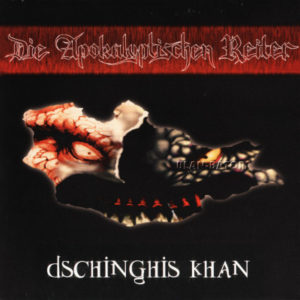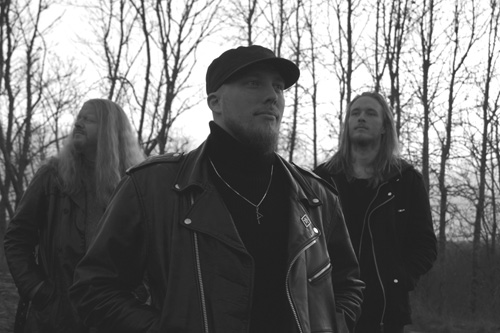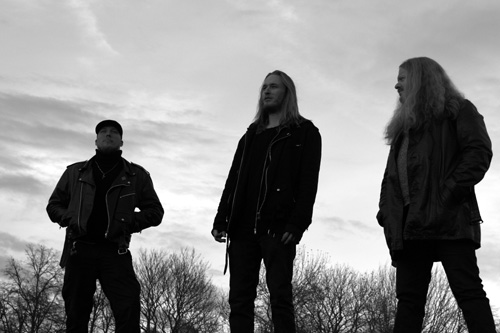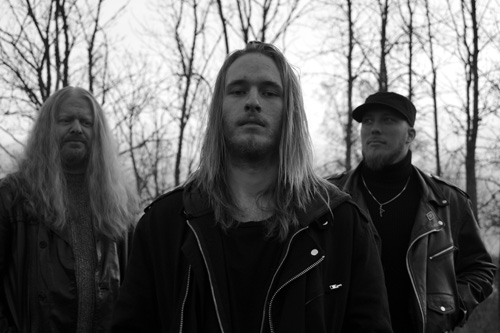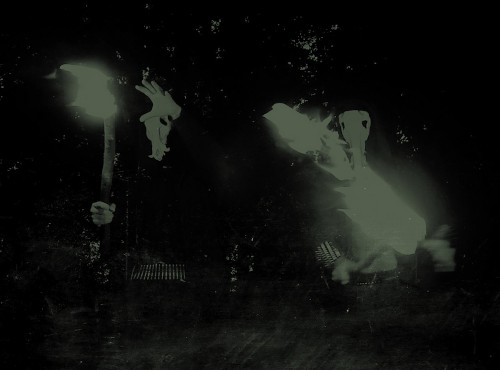
Good music can be released on any medium, of course, but when a band releases their demo as a tape, I’m doubly excited. There can hardly be two opinions about Boarhammer, who recently released their debut in this way: they are simply very, very good.
It’s nice that The Vessel (vocals, drums, bass) and Wodwoz (guitars, vocals) agreed to talk!
I am incredibly old and for that reason alone I immediately fell in love with “I: Cutting Wood For Magickal Purposes”. For all its originality, it sounds exactly like the early / mid 1990s. Is it presumptuous to assume that you have a certain love for the old Black Metal of Eastern Europe?
The Vessel: No, it’s not presumptuous at all. Master’s Hammer in particular is a band we hold in high regard. The combination of oddballness, traditional heavy metal, fury, and almost operatic bombast is something that impressed me quite a bit when I first got to hear it sometime in the 90s.
Through my grandmother’s origins, I also have a personal connection to Eastern Europe: she came from the region of the High Tatras and brought me into contact with numerous myths, legends, stories of occult practices and strange events etc. already in early childhood. Perhaps this shaped my interest in these subjects.
Wodwoz: Merula, first of all, thank you very much for the confession of love – we feel very honoured! Sure, there are quite a few bands we listened to regularly even during the making of the demo. Definitely Master’s Hammer. Tormentor are also great, but they sound completely different. So it’s quite possible that one or the other influence has crept in. In general, we try to find our own musical language and not to be the thousandth clone of something. Maybe it’s exactly this approach that brings us close to the bands you mentioned.
I hear a lot of influences from occult and black-tinged heavy metal. Also stirring twin guitars, for example in “Spirits on Black Wings”. My first thought, this sounds very much like old Messiah, was later put into perspective and probably referred more to the ingenious vocals.
Nevertheless, “Hymn to Abramelin” and “Extreme Cold Weather” are immortal and should be heard monthly, right?
The Vessel: To be honest, Messiah have not been a band of much relevance to us; in fact, it was through your reference to them that I first became aware of the band. That may be an educational gap, but it’s true. However, I find the vocals on “Hymn to Abramelin” pretty great.
Wodwoz: I’m afraid I’ll have to pass on that one too… Messiah have also passed me by so far. But thanks for the tip, cool shit! I generally like bands that produced extreme metal across genre boundaries in this small time window somewhere in the mid-eighties.
You formed in 2020, released a strong tape in 2021. What’s coming in 2022?
The Vessel: We are still working on new songs and hope to record them later this year. A few weeks ago we got in touch with the small but nice label Naturmacht Productions; Robert was quite taken with our demo tape and will probably release our next recordings. When that will happen, however, is not yet definite. We hope to release our first album in 2023.
Wodwoz: We have definitely tasted blood! When we started the band one and a half years ago, the only thing we really wanted to do was to finally make some noise in the rehearsal room again and, in the best case scenario, produce a few songs that we ourselves would enjoy. Although we have been friends for a long time, it never happened before that we made music together. To be honest, we were a bit surprised that the chemistry worked out so well in the end. In the meantime, the demo is half a year old and since then it’s been a wild ride: we’ve received masses of positive reviews and feedback, sold out our tapes completely and even found a label, Naturmacht, that is willing to release our next work.
A good and friendly label is an asset. But what if you received an offer from the very top, let’s say Napalm or Nuclear Blast?
The Vessel: I don’t think such a big label would be an option for us. We are convinced advocates of the DIY ethos and are not prepared to let ourselves be talked into our ideas and convictions from the outside. I can hardly imagine that a big record company would give a niche band like us full artistic freedom, but that’s what we want. With a label like Naturmacht, we feel that people like Robert are doing it for the right reasons and that they too care about the independence of the artists, which should be encouraged rather than restricted. If it’s more about sales figures than about the music, things become difficult and also uninteresting for us. We love what we do, but fortunately we are not dependent on making money with it.
Wodwoz: Major labels knocking on our door is a nice thought process, but nothing more. There is a small but fine target group of freaks for our music, from which we have received an incredible amount of positive feedback within the last six months since the release of our demo. And that’s the only reason we’re doing this. Of course we want to reach more people in the future, but definitely still in the underground and with full creative control!
When I looked into this internet, I was amazed that there really is a weapon called Boarhammer. Were you aware of that when you came up with the name, or was it inspired by the hammer drill (its german name is Bohrhammer), or was the naming simply done on a spiritual level?
But apart from that, what is your favourite hand tool? (Mine is the water pump pliers, also called pipe wrenches. You can grab, twist, screw, break, hammer and even throw with it).
The Vessel: Do you mean that fantasy tabletop or computer game thing, or that sling for hunting? (The sling thing that seems to somehow cushion the pressure of the gun. – m.) We have actually discovered these devices in the meantime. We were not aware of either when we came up with the name, but at least the fantasy weapon fits somehow….
In fact, when finding the name, we thought about how we could find a symbol for our thematic-philosophical background on the one hand, and on the other hand how we could make a more or less obvious reference to the representatives of the primordial soup of Black Metal, who influenced us because we grew up with their music. For us, “Boar” symbolically embodies our forest- and myth-relatedness quite well; Hellhammer are just super, so one fits into the other.
Wodwoz: The fact that we often directly arouse these DIY associations with the German-speaking public was not intended, but probably can’t be changed now, haha. Our sound has been compared several times to a pack of wild boars raging through the undergrowth and leaving a trail of destruction – I find that more fitting.
If you google this boarhammer hunting accessory thingy, you’ll find loads of photos and videos of asshole hunters shooting wild boars and anything else they can get their hands on for the sheer fun of it, and then posing with the trophies. May they all be mauled in agony by the righteous tusks of the mighty Boarhammer!
Are you more excited about the new King Diamond, or the new Mercyful Fate album? And if neither, would you at least like to chat a bit about your relationship or attitude towards the King?
The Vessel: I’m definitely more excited about the new Mercyful Fate album. The first two albums, “Melissa” and “Don’t break the Oath”, are really strong classics for me. This mixture of first class guitar work and the King’s unique vocals is unmatched.
Wodwoz: I’m really looking forward to both albums, but I have no illusions that the new discs can even come close to the classics. Of course, it always has the character of an event when legendary bands release a new album, and I always enjoy sitting down with it in peace. But to be honest, it tends to have the effect that I tend to put on an old record by the band in question relatively quickly. I’m definitely more excited about the new Mercyful Fate! I’m not a mega-fan and I don’t know all the later MF and Kind Diamond albums by a long shot. In principle, “Melissa” and “Don’t break the Oath” are really enough for me. Both albums breathe a spirit that the King could not reproduce with his later line-ups.
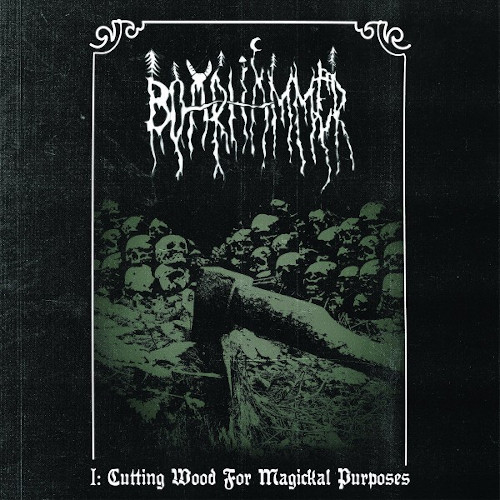
Imagine you are given a choice: You can either listen to any musical release before the year 2000, and not only listen to it, you may add the original recordings to your collection. But nothing after 1.1.2000, not even a new release, this world remains closed to you forever.
Or you may listen to and collect everything from 2000 until the end of your earthly days, really everything. And for free. But the music before 2000 is gone forever.
How would you decide?
Wodwoz: I follow very closely what new releases come out week after week, and I’m always on the lookout for new musical discoveries. I would miss that a lot, but I still choose option A. I increasingly find that I have such a strong nostalgic connection to albums I discovered in the early nineties that very few post-2000 releases come close to. Besides, there’s still so much to discover across music history that you can’t listen to it all in one lifetime. So it wouldn’t be boring with only old music.
The Vessel: Definitely the music from before 2000. The amount of innovative bands that existed between, let’s say, roughly 1970 and 2000 in the Rock and Metal field must not be lost. Of course, there have been great bands since 2000 and there are still great bands today that break boundaries and are able to add new facets to metal music. But if everything before 2000 was gone, that would probably be the more dramatic loss for me.
I suspect you have a deep connection to nature. Does this only refer to rituals in the dark woods, or do you also go fishing, hunting, looking for mushrooms or collecting herbs?
The Vessel: Being out in the dark woods is definitely part of the Boarhammer routine; the forest is the natural habitat of the Boarhammer, so to speak. This is where we decided to found the band, and this is where many important ideas around our music and our concept were and still are born. My relationship to nature, however, is much more diverse and is not limited to the band. Nature is important to me both in terms of concrete experience (e.g. through hiking, looking at and feeling the landscape and weather, but definitely also through collecting herbs or materials) and philosophically (e.g. regarding the symbolic level of the meaning of the forest, the mountains, the sea etc. in various mythologies).
Wodwoz: Picking mushrooms as well as wild and medicinal herbs has become more and more important to me in recent years. I find it fascinating what variety there is, and at the same time frightening how far we have moved away from the knowledge and practices of our ancestors with our modern way of life. I have great respect for hunting and fishing in its archaic form. Neither plays a role for us though, the Boarhammer coexists peacefully with all creatures of the woods and waters!
I like the statement in the booklet. (“Being an agent of chaos, BOARHAMMER deeply despises all kinds of concepts that aim at establishing an order of hierarchy of any kind, including ideas like racism, misogyny, sexism, fascism or any other -ism in the same vain. If you approve of concepts like that, BOARHAMMER is not for you.”)
Does “agent of chaos” mean sympathy for anarchy, or is that much, much deeper than any political view? Or both?
The Vessel: Both, actually. In the context of black metal, I find the reference to the world view of the church in England in Shakespeare’s time, for example, very interesting. In the Elizabethan worldview, there is a strict, God-given hierarchy, at the top of which is God himself and which assigns man a clearly superior role to the rest of nature. Within human society, again, a strict hierarchy exists. These circumstances are considered to be so willed by God; any rebellion embodies the power of chaos (of which the devil is the personification) and must be smashed for the sake of preserving or restoring order.
If one now considers black metal as a kind of nihilistic principle that questions and negates valid values and norms, i.e. as a mode of action of chaos, it cannot be justified as a political instrument – as in NSBM – because as such it would rather have the function of preserving or advancing hierarchies, i.e. shaping orders. This seems contradictory to me.
Does “I” mean that this delicious demo tape is the first part of a cycle?
The Vessel: Exactly. There will definitely be more to come. We are already following up on our concept and working diligently on new material.
Wodwoz: Yes, after all the positive reactions to our demo, the motivation to launch the next release is huge!
Thank you, big BOARHAMMER, and good luck for your future
